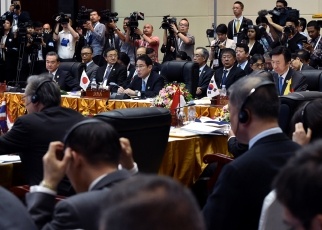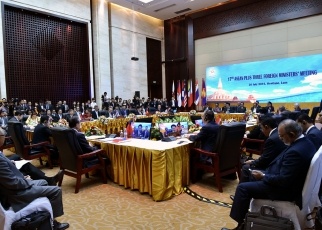Asia
The 17th ASEAN Plus Three Foreign Ministers’ Meeting



The 17th ASEAN+3 Foreign Ministers’ Meeting was held in Vientiane, Lao PDR, on Tuesday, July 26 from 9:10a.m. to 10:55 a.m.(local time).Fumio Kishida, Minister for Foreign Affairs, attended the meeting. The overview of the meeting is as follows.
1. Opening remarks
H.E. Saleumxay Kommasith, Minister for Foreign Affairs of Lao PDR made his opening remarks, followed by Minister Kishida. Minister Kishida’s statement included following points
(1) Japan will continue to strongly support further integration of ASEAN community.
(2) Taking into account recent conditions, including the United Kingdom’s exit from the European Union (EU), Japan believes that it is vital to make efforts to enhance the predictability of regional and world economic trends, reduce vulnerabilities as well as maintain and strengthen the free trade regime. Japan will cooperate closely with the ASEAN Plus Three countries.
(3) Japan is a host country of the Japan-China-ROK Trilateral Summit this year. The Japan-China-ROK cooperation process has fully normalized. Japan hopes to begin by holding the Japan-China-ROK Trilateral Foreign Ministers’ Meeting and utilize results from the meeting as the basis for the Japan-China-ROK Trilateral Summit Meeting.
2. Review and future direction of ASEAN Plus Three cooperation
(1) Foreign Minister Kishida pointed out following six points on Japan’s initiatives related to ASEAN Plus Three cooperation.
(ⅰ) Importance of Expanded Partnership for Quality Infrastructure
Last year the Government of Japan announced measures including expansion and acceleration of assistance made by Japan International Cooperation Agency (JICA), closer collaboration with the Asia Development Bank (ADB), and expansion of risk-money supply by the Japan Bank for International Cooperation (JBIC) for promoting quality infrastructure investments and is currently implementing these measures. In addition Japan announced this year the “Expanded Partnership for Quality Infrastructure” that aims to finance of approximately USD 200 billion as the target for the next five years to infrastructure projects across the world together with other measures.
G7 Ise-Shima Summit this year adopted the G7 Ise-Shima Principles for Promoting Quality Infrastructure Investment and clarified necessary features of quality infrastructure investments including ensuring economic efficiency in view of life-cycle cost, safety and resilience against natural disaster, safety, job creation, capacity building, and transfer of expertise, addressing social and environmental impacts and ensuring alignment with economic and development strategies. Japan hopes that ASEAN Connectivity 2025, which is currently being formulated, will reflect these aspects of quality infrastructure investments.
(ⅱ) Financial Cooperation
Foreign Minister welcomed that financial cooperation has been developed in ASEAN+3. It is important to minimize risks raised by the withdrawal of the United Kingdom from the EU. For enhancing financial network, Japan will continually take initiative for regional financial cooperation in ASEAN+3.
The agreement establishing ASEAN+3 Macroeconomic Research Office (AMRO) entered into force in February 2016, and AMRO transferred into an international organization. Japan will continually take leadership for entrusting AMRO from international community.
(ⅲ) Economics
Negotiations for Regional Comprehensive Economic Partnership (RCEP) are an important pillar for East Asia economic integration. Japan will negotiate proactivelly while cooperating with relevant countries, aimed at comprehensive, well-balanced and high-level agreement. Japan welcomes the holding of ASEAN Plus Three Leaders' Interface with the East Asia Business Council at the ASEAN+3 Summit held in November 2015 for the first time.
(ⅳ) Food security
Japan has provided rice assistance to the Philippines, Cambodia and other countries through the framework of ASEAN Plus Three Emergency Rice Reserves (APTERR) Agreement. Japan intends to strengthen cooperation in the fields of food security.
Japan is making specific investment projects by public and private partnership aimed at building the “food value chain” and expects to expand these cooperation forward.
More than five years have passed since the Great East Japan Earthquake. Some countries have eliminated or relaxed import restrictions on Japanese food products. Japan is calling on countries which still have restrictions to eliminate or relax regulations as quickly as possible based on scientific evidence.
(ⅴ) People-to-people connectivity
People-to-people connectivity is important field. Japan welcomes the signing of the “Memorandum of Cooperation (MOC) on ASEAN Plus Three Tourism Cooperation” in January 2016.
Japan believes that Human resource development is important for sustainable growth of ASEAN. Japan would like to boost human resource development and people to people connectivity through Industrial Human Resource Development Cooperation Initiative or overseas education program for advanced human resources development which connect ASEAN and Japan.
(ⅵ)East Asia Vision Group II
A follow-up to “the Final report on the follow up to the East Asia Vision Group(EAVG)II” is crucial. Japan takes lead countries for public health or higher education.
(2) In response, many countries mentioned the developments of financial cooperation including the transformation of AMRO into international organization or Chiang Mai Initiative Multilateralisation (CMIM), importance of early conclusion of negotiations for RCEP, developments of food security including APTERR, benefit of the MOC on ASEAN Plus Three Tourism Cooperation which was signed this year.
3. Exchange of opinions on regional and international affairs
(1) Foreign Minister Kishida made the following three points.
(ⅰ) The importance of addressing terrorism and transnational crime is increasing. A terrorist attack happened in Dhaka on July 1 (local time), which killed around 20 people, including seven Japanese nationals. Terrorism and kidnapping incidents caused by Islamic extremists have been taking place in the ASEAN region as well. Japan intends to address threats toward transnational crimes including terrorism, violent extremism and radicalism while cooperating closely with ASEAN Plus Three countries.
(ⅱ) Nuclear and missile development by North Korea are clear violation of the Security Council resolutions and constitutes serious threat to peace and security in the region and the international community. It is important to strengthen pressure on North Korea, including through strict implementation of the Security Council resolutions. The ASEAN Plus Three should strongly urge North Korea to refrain from any provocations, such as nuclear tests and ballistic missile launches, and comply with the Security Council resolutions etc. The abductions issue is a critical issue concerning Japan’s sovereignty and the lives and safety of the Japanese people. Japan will continue to urge North Korea to return all the abductees to Japan at the earliest possible date. Japan hopes to gain understanding and cooperation from ASEAN+3 member states.
(ⅲ) Japan-China-ROK Trilateral cooperation process had been completely restored on the occasion of the trilateral summit in November last year. Japan would like to hold Japan-China-ROK Trilateral Summit and Foreign Minister Meetings this year which provide results in a number of areas including economy, environment, disaster risk reduction and youth exchange.
(2) In response, many countries expressed concern about the recent developments of North Korea including nuclear test or ballistic missile launches. Some countries pointed out the importance of Japan-China- ROK Trilateral cooperation. At the same time some countries extend their condolence to incidents occurred in Japan (Sagamihara stabbings) on July 26.

